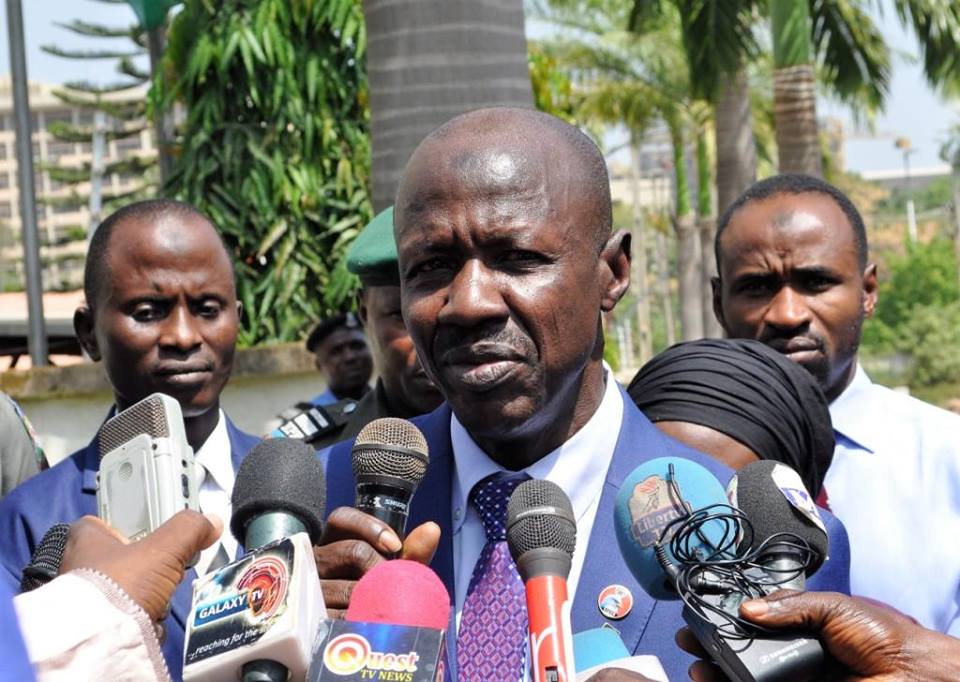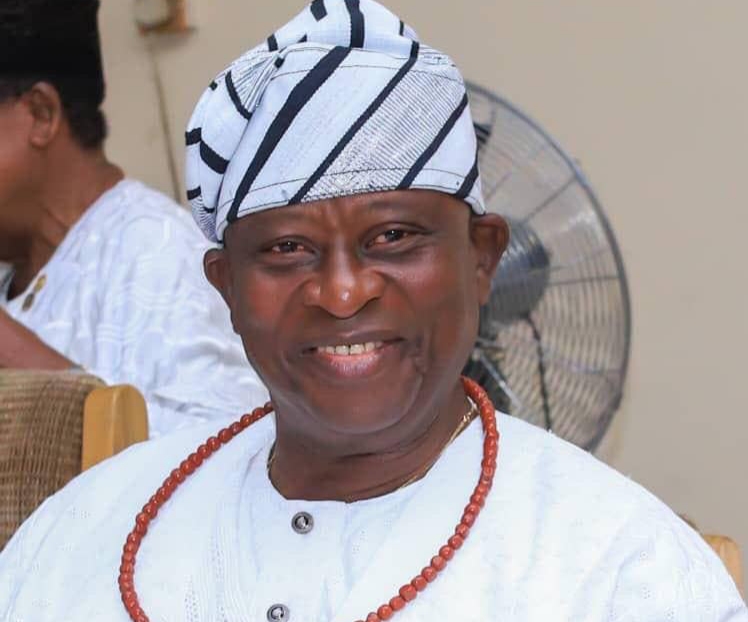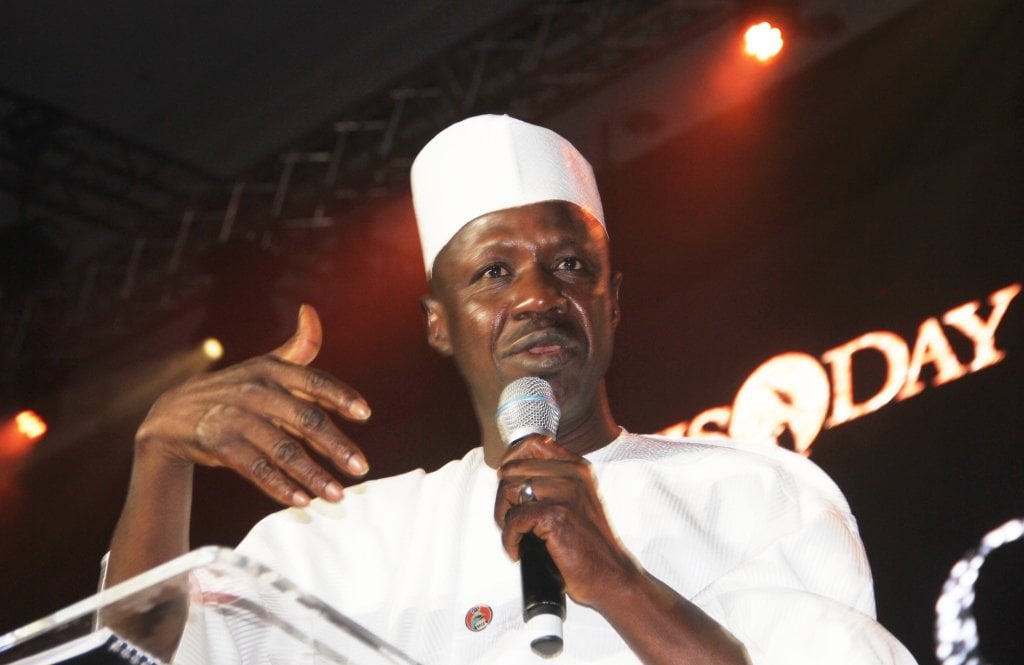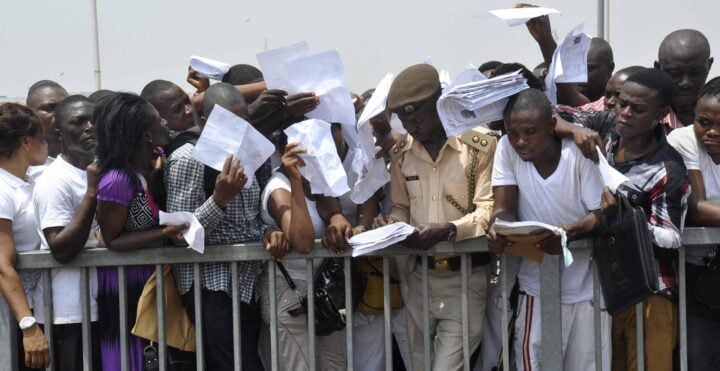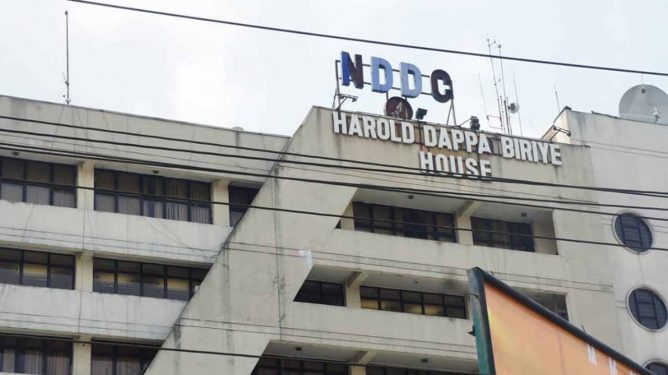BY THEOPHILUS ABBAH
Nuhu Ribadu booted out, demoted (2008). Farida Waziri sacked! (2011). Ibrahim Lamorde removed, under probe (2015). Ibrahim Magu arrested, detained, grilled (2019). With these fragmented statements and reads-on that scream from the headlines of dailies, each chairman of the Economic and Financial Crimes Commission (EFCC), was, with bleary eyes, ingloriously booted out of the seat of fire. Were they round holes in square pegs? Were they hypocrites, double-faced or impostors? Did they come under the spell of powerful witches or wizards who have put a curse upon the executive chair? The answer may be none of the above.
In an interview with a former Chairman of the Independent Corrupt Practices and Other Related Offences Commission (ICPC), this reporter was initiated into an invisible realm from where he saw how anti-corruption agencies’ chairpersons were asked to fly to high heavens though a rope had been tied to their legs. This realization emerged from an off-the-cuff, side statement at the end of a ‘formal interview’ on the ICPC’s fight against corruption.
“As soon as petitions against high-profile persons are submitted at ICPC office, here, even if I hadn’t seen the documents, calls would come from the presidency, Ministry of Justice, the ruling party, governors, and influential Nigerians, asking me to ignore such petitions,” he revealed.
Advertisement
This sounds like a contradiction, or better still, like a Chief Executive Officer of an organization who corruptly inflates invoices in order to steal from his own company. Why would The Presidency appoint a man of integrity to lead the fight against corruption, but turn around to obstruct the chairman when he raises his hands to battle? Under this atmosphere, each EFCC chairperson since 2003 fought two battles – one against corrupt Nigerians, and the other for their life, as corruption fought back directly and by proxy through government.
The EFCC Act gives the Commission enormous responsibilities. Section 5(b, c, d) would scare any faint-hearted CEO who is thrust into the den of criminals to fight them. It says, the Commission is responsible for “the investigation of all financial crimes, including advance fee fraud, money laundering, counterfeiting, illegal charge transfers, futures market fraud, fraudulent encashment of negotiable instruments, computer credit card fraud, contract scam, etc; the co-ordination and enforcement of all economic and financial crimes laws and enforcement functions conferred on any other person or authority; the adopted measures to identify, trace, freeze, confiscate or seize proceeds derived from terrorist activities, economic and financial crimes related offences or, the properties the value of which corresponds to such proceeds…” It goes further to add that the Commission has the task of “the examination and investigation of all reported cases of economic crimes with a view to identifying individuals, corporate bodies or groups involved; the examination of the extent of financial loss and such other losses by government, private individuals or organisations…”
As one reads the EFCC Act, the responsibilities of the Chairman tumbles down like torrential rains, and anyone who does not get drenched in it would be a superhuman. The quantitative pronoun ‘all,’ used three times in this brief excerpt, and other expletives like etcetera, and phrases like ‘such proceeds,’ ‘such other losses,’ ‘any other person or authority,’ and several ellipsis in it, are like a blank check for EFCC chair to fight on multiple fronts. On the flipside, the words and phrases highlight the enormity of the task before any and every EFCC boss. But beyond being an extraordinary individual, every EFCC chairman is caught between being a jolly good fellow, who looks away when corrupt acts are committed, or becomes an enemy of criminals, the mighty and powerful. Truth be told, some powerful Nigerians add criminality to their hard work, such that if a diligent EFCC chairman scratches the surface of their stupendous wealth, what oozes out is a stench of corruption. If a chairman goes after such powerful individuals, he may be left to nurse blisters like an amateur boxer who trains by hitting a gate of brass or a hard rock with his bare hands.
Advertisement
Malam Nuhu Ribadu who did the unthinkable by prosecuting former Governor James Ibori was whipped out of his chair, demoted from his police rank as Assistant Inspector General (AIG) of Police to Assistant Commissioner. He was chased about like a common criminal, making him to raise an alarm that his life was in danger. He had to opt for an early retirement from the Nigeria Police Force and later went into exile. Mrs Farida Waziri, the first female chair of the EFCC, a top investigator, was removed unceremoniously when she unearthed the massive corruption in the petroleum subsidy regime under former Petroleum Minister Diezani Alison-Madekwe. It was Farida Waziri who investigated the corruption that brought down the banking sector and caused multi-billion Naira losses to Nigerians. In the maze of the monumental financial losses, the Nigerian stock market tumbled abysmally, and thousands of Nigerians who traded in the shares of Nigerian banks had their fingers burnt beyond recovery.
Yet, because she stepped into a sacred shrine in the petroleum sector and gathered the momentum to scream, Farida was thrown out through the screen of the Nigerian Television Authority (NTA).
In the last five years, Ibrahim Magu has been like the proverbial mortal man who walked into a territory where angels feared to go. Under his chairmanship, high profile cases, especially those involving governors, which had gathered dusk in courts for over a decade, were revived and prosecuted to a logical conclusion. Former governors Joly Nyame, Joshua Dariye, and Orji Uzor Kalu were convicted and jailed. Even a former Minister of Justice and Attorney-General of the Federation, EFCC’s supervisory minister Mohammed Adoke, has been made to face prosecution for over $2 billion Malabu oil deal. Under Magu the agency made efforts to extradite former Minister of Petroleum Resources Diezani Allison Madueke from Britain to face corruption charges. Now, he is suspended and being probed over allegations lined up against him by the Minister of Justice and Attorney General of the Federation, Abubakar Malami. The allegations include the followings:
• Alleged discrepancies in the reconciliation records of the EFCC and the Federal Ministry of Finance on recovered funds.
• Declaration of N539 billion as recovered funds, instead of N504 billion earlier claimed.
• Insubordination to the Office of the AGF
• Alleged late action on the investigation of P&ID, leading to legal dispute;
• Not respecting court order to unfreeze a N7 billion judgment in favour of a former executive director of a bank.
• Not providing enough evidence for the extradition of Diezani Alison-Madueke
• Alleged delay in acting on two vessels seized by the Navy
• Alleged favouring of some investigators, called Magu Boys
• Reporting some judges to their presiding officers without deferring to the AGF
• Alleged sale of seized assets to cronies, associates and friends
• Alleged issuance of investigative activities to some media prejudicial to some cases
Advertisement
Only the judiciary can express an opinion on these issues. But the recurring cold and open warfare between Ministers of Justice and EFCC Chairpersons is inimical to Nigeria’s integrity in her fight to end corruption. Nuhu Ribadu was chased away by Michael Aondooka; Farida Waziri’s no-love-lost relationship with Mohammad Adoke was not hidden, as Adoke openly declared in an interview that Farida was too powerful as EFCC chairperson. It is the turn of Magu to face fire from Malami, and this fire is more ferocious than those faced by Magu’s predecessors. It is yet to be seen how this would end, now that all the witches and wizards he defied have gathered in covens to celebrate Magu’s dethronement from EFCC’s exalted chair.
It has become evident that if EFCC is not independent, anyone appointed as chairman of the agency would not escape Magu’s fate. Yes, AGFs are the albatross of EFCC chairmen. They would always have an ace up their sleeve, accumulating secret details of the slips of EFCC chairmen who would not dance to their music, and wait for EFCC chairmen’s vulnerable moment to strike and bite hard with poisonous and deadly teeth. From all indications, the EFCC chair and AGF are like apples and oranges, perpetually irreconcilable. The EFCC chair who would escape such unkind treatment must become hypocrites, pretending to fight corruption but, in reality, jumping in bed with corrupt individuals, enjoying himself and drinking wine brewed in the winery of financial fraud.
But it is not enough for a farmer to make ridges and plant crops. He must protect his crops by removing the weed around them with herbicide, add manure, and even scare away birds and animals that feed on them. Unless a farmer does these, he would never expect a bumper harvest. Nigeria depends on an effective anti-corruption agency, like EFCC, to rid the country of corruption. Other political bodies vested with anti-corruption powers, like the National Assembly, and state Houses of Assembly, have failed to lift a finger in this fight. Anti-corruption agencies like ICPC, EFCC, Auditor-General of the Federation, and Code of Conduct Bureau are the few taking up this challenge. Therefore, government must protect, nurture and defend EFCC and its leadership from sharks, else, in the near future no man of integrity would accept the position of EFCC chairperson.
Abbah wrote this piece from Abuja
Advertisement
Views expressed by contributors are strictly personal and not of TheCable.
Add a comment
